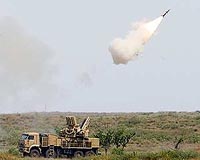| . |  |
. |
Brussels (AFP) June 9, 2010 NATO will appeal to its member states at a ministerial meeting this week not to sacrifice defence spending on the altar of fiscal discipline, while promising to take the knife to its own budget. The 28 allied nations, from the US to Turkey, must not "cut too much, or in the wrong way," as deep reductions in defence spending "might jeopardise our security in the future," NATO Secretary General Anders Fogh Rasmussen warned Monday. "Economic prosperity depends on security too," he insisted ahead of the NATO defence ministers' meeting in Brussels on Thursday and Friday. It is a tradition that NATO calls its members to order as three-quarters of them fail to respect the agreed target of at least two percent of national output being dedicated to defence. American defence spending easily beats three percent of US GDP, the more than 661 billion dollars accounting for almost half the world total last year. On the other hand, Washington's European partners have largely benefited from the 'peace dividend' since the end of the militarily-expensive Cold War. According to NATO figures Germany, Italy and Spain dedicated 1.3 percent of their GDP to defence in 2008. The figures for the years 1985-89 were 2.9 percent, 2.2 percent and 2.1 percent respectively. Even nuclear powers Britain and France spend just a tenth of what their transatlantic partners do on defence, while managing to keep the level above two percent of output. This spending too is well below their respective 4.4 percent and 3.7 percent spending levels seen before the East-West tension subsided. Now it's deficits, rather than dividends, which are putting the squeeze on European defence spending, and Rasmussen fears the cuts will hurt. German Chancellor Angela Merkel on Monday announced a string of austerity measures, including cutting the nation's armed forces by perhaps 40,000 soldiers. NATO already complains of being short of equipment, notably helicopters. Rasmussen is also hoping to secure pledges for hundreds more military trainers to help build effective military and police forces in Afghanistan. On Monday Rasmussen promised to cut non-essential NATO spending internally, in the hope of avoiding external cuts on the essential stuff. Keenly aware of the pressures on national budgets, Rasmussen told reporters that the alliance will itself cut 1.5 billion euros (1.8 billion dollars) off its own budget thanks to "savings and deferrals". The measures will involve setting clear spending priorities, improving auditing, and "a major reduction in the number of committees in this organisation." Therefore "we will all spend less time in meetings, which I consider a significant contribution to efficiency," he promised. At their last meeting, in Istanbul in February, the NATO defence ministers agreed to plug a 640 million dollar hole in the budget. The annual NATO budget is around two billion euros. Around half of that spending goes on operations, the other billion on infrastructure and administration. "As a former (Danish) prime minister, I'm well aware that when health and education and pensions are being cut it is hard to exempt defence altogether," Rasmussen told reporters at his monthly press conference at NATO headquarters in Brussels Monday. His promises of NATO belt-tightening came after nine member states -- including the United States, Britain, France and Germany -- wrote a letter in April calling for reforms both at the alliance's headquarters and its agencies and command structure. an allied official said. They want to go further than the planned reduction from 17,000 to 13,000 personnel within the alliance's permanent military staff. For these countries the quarters are too generous and the Cold War-era committees too numerous. Paris has spoken of a 30 percent cut in the number of "Natonians". Washington insists the priorities must be the conflict in Afghanistan and the anti-missile defences in Europe, a project which will also be considered by the defence ministers this week. Whatever the ministers decide will go forward for approval at a NATO summit in Lisbon in November.
Share This Article With Planet Earth
Related Links The Military Industrial Complex at SpaceWar.com Learn about the Superpowers of the 21st Century at SpaceWar.com
 Algeria And Libya Set To Buy Russian Pantsir-S1 Short-Range Air Defense Systems
Algeria And Libya Set To Buy Russian Pantsir-S1 Short-Range Air Defense SystemsAbu Dhabi UAE (RIA Novosti) Jun 09, 2010 Algeria and Libya are ready to buy Russian Pantsir-S1 short-range air defense systems, deputy head of the Russian Military-Technical Cooperation Service Vyacheslav Dzirkaln said on Wednesday. "The new system has shown high efficiency. Algeria and Libya have shown interest. Syria has already bought these systems in the past," Dzirkaln said, adding that other potential customers were likely ... read more |
|
| The content herein, unless otherwise known to be public domain, are Copyright 1995-2010 - SpaceDaily. AFP and UPI Wire Stories are copyright Agence France-Presse and United Press International. ESA Portal Reports are copyright European Space Agency. All NASA sourced material is public domain. Additional copyrights may apply in whole or part to other bona fide parties. Advertising does not imply endorsement,agreement or approval of any opinions, statements or information provided by SpaceDaily on any Web page published or hosted by SpaceDaily. Privacy Statement |